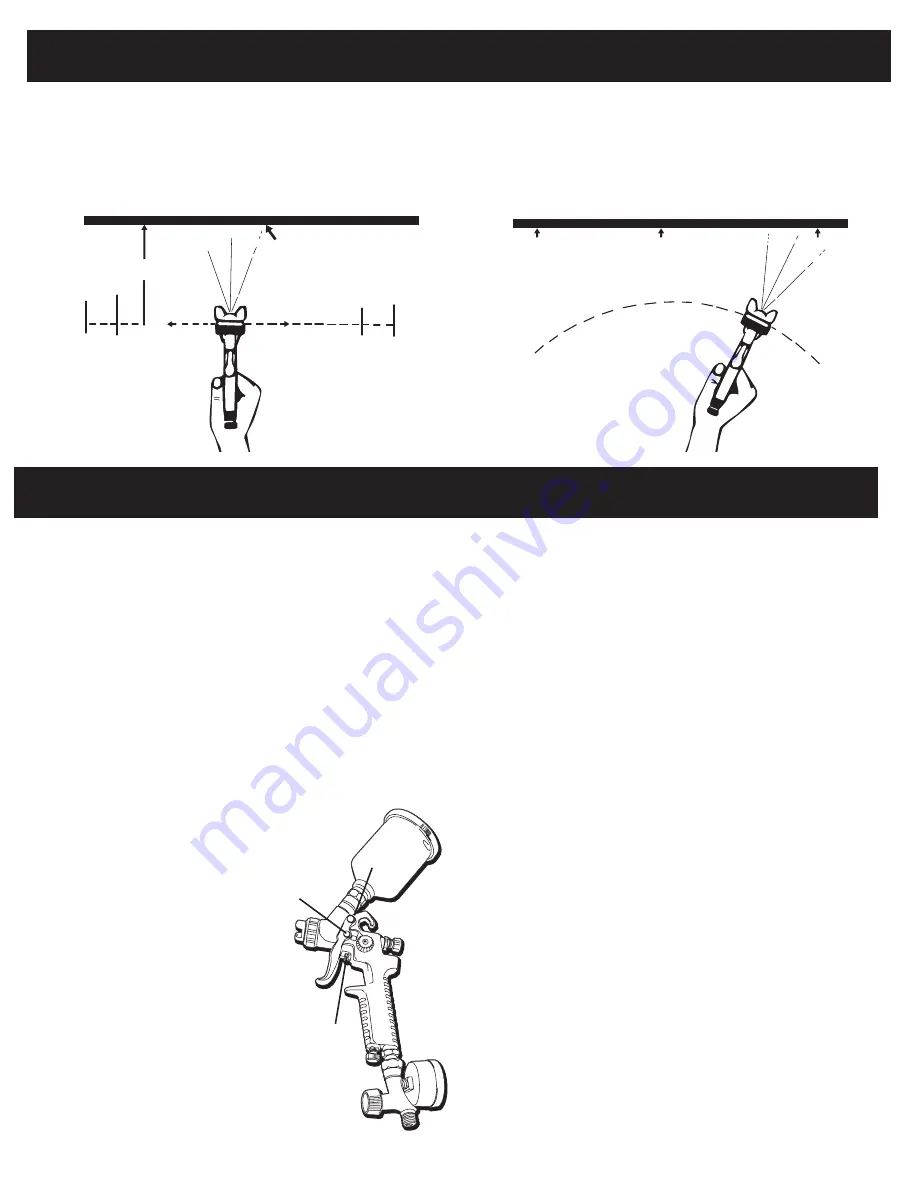
9013B:
Parts Breakdown & Operating Manual
5
rev. 04/3/06
Fig. 1
C
A
B
on material and atomizing pressure. For a uniform finish, lap each
stroke over the preceding stroke, making sure the spray is smooth
and wet.
Using the lowest possible atomizing air pressure will reduce
overspray and provide maximum efficiency.
Proper handling of the gun is essential for obtaining a good finish. The
gun should be held at a right angle to the surface being covered, and
moved parallel with it. For precise control of the gun and material, the
trigger should be released before the end of the stroke.
Hold the gun from 6 to 12 inches away from the surface depending
AIR NOZZLE, FLUID NOZZLE, AIR VALVE ASSEMBLY
1. All nozzles and needles are made to exact standards. They should
be handled carefully.
2. To clean nozzles, immerse them in solvent until any dried
material is dissolved, then blow them clean.
3. Do not use metal or sharp instrument to probe any of the holes in
the nozzles.
4. Air flow should occur before fluid-flow when the gun is triggered. It
may be necessary to adjust the fluid control screw to make sure
air flows before fluid.
5. Do not alter the gun in any way.
GRAVITY FEED
Turn off air supply. Remove cover of cup. Empty the cup of material.
Clean the cup and cover. Turn on air supply and spray with proper
cleaning solvent. Repeat with clean solvent if necessary. Remove
solvent, disconnect gun, remove air cap and clean. Wipe gun and cup
with rag dampened with solvent.
CAUTION…
To avoid cross-threading, all spray gun parts should be screwed
in hand tight initially. If the parts can not easily be turned by hand,
be sure you have the correct parts, unscrew, realign, and try again.
NEVER use excessive force in matching parts.
OPERATION
CLEANING AND MAINTENANCE
Light Coat
Heavy Coat
WRONG
Start
stroke
Pull
trigger
Release
trigger
End of
Stroke
RIGHT
Even and wet coat
6 to 12 inches
SPRAY GUN
1. Submerge the front end of the gun in solvent just until the fluid
connection is covered.
2. Paint that has built up on the gun should be removed using a
bristle brush and solvent.
3. Never submerge all of the spray gun in solvent because:
• This will dissolve the lubricant in the leather packings and
on wear surfaces, causing them to dry out and resulting in
difficult operation and faster wear.
• Air passages in the gun will become clogged with
dirty solvent.
4. Using a rag moistened with solvent, wipe down the outside of
the gun.
5. Oil gun daily. Use a drop of lightweight machine oil on:
A. fluid needle packing
B. air valve packing
C. trigger pivot point
See Fig. 1 for Location of Above Points.
6. NOTE: Do not soak rubber o-rings
or seals in paint thinner. O-rings
and seals can be wiped clean with
paint thinner but soaking can cause
these items to deteriorate over time.
7. Caution: Do not use lubricants
which contain silicone. Silicone may
cause defects in the finish application.






















